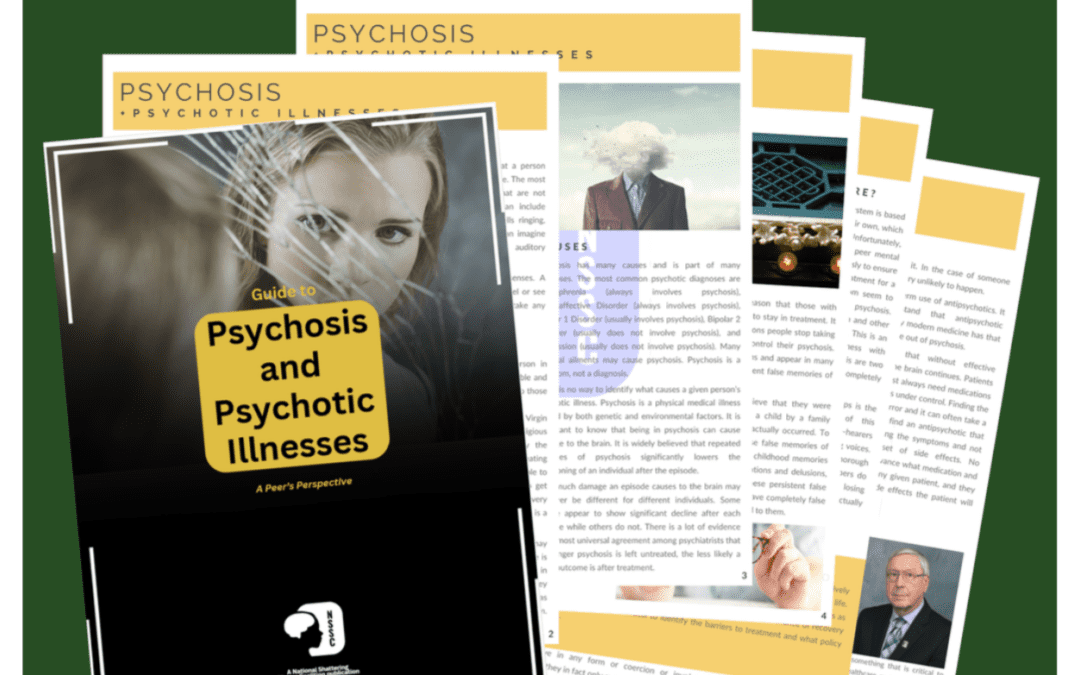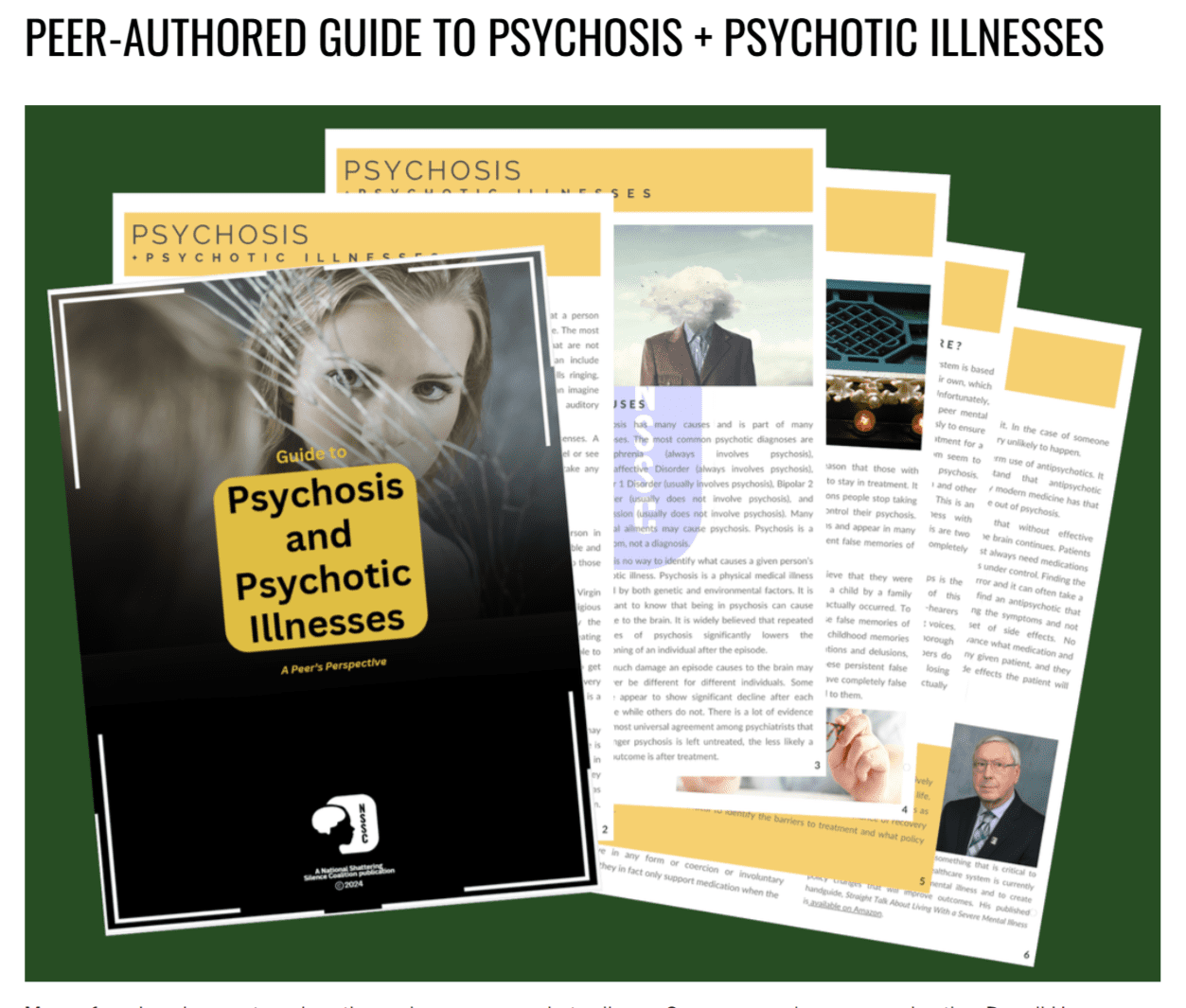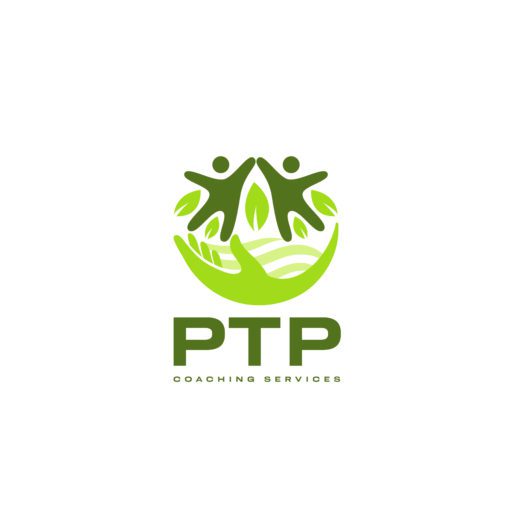
Anosognosia, HIPAA, & Assisted Outpatient Treatment

Three Issues Families Face
There are three common themes that families face when their loved ones with serious mental illnesses/serious brain diseases (SMI/SBD), like schizophrenia spectrum disorders, schizoaffective disorder, and bipolar disorder, need help.
The first theme involves the symptom of anosognosia, which means “unaware of being ill.” Even when there is a diagnosis of an SMI/SBD, the lack of insight by the individual into having a major, lifelong, chronic illness that affects their brain and influences their identity is a stumbling block for recovery or stability. Anosognosia is a significant factor in treatment non-compliance and not voluntarily accessing treatment. And it stands to reason; who would take medication for an illness they don’t believe they have? To this end, the National Shattering Silence Coalition has produced a fantastic brochure written by Darrell Herrmann that explains psychosis, psychotic illnesses, and anosognosia and provides a powerful resource when attempting to collaborate with your family member’s treatment team. You can download it here.
The second theme that frustrates family members and caregivers is the restrictions for a reciprocal flow of information due to the current HIPPA laws. Initially, the laws were designed to prevent employers and other public entities from accessing our personal medical information. However, HIPPA has been extended to withhold any access to share medical information without the patient’s permission. In practice, this means that our loved ones with SMI/SBDs and anosognosia can effectively prevent us from participating in their treatment. Family members and caregivers naturally have valuable personal information that the treatment team should know, and it is imprudent to ignore it. When they contact the treatment team, the professionals often disclose contact and personal information from outside sources directly to the patient. In other words, the treatment team is given this valuable information. Then, it discloses to the client who gave them the information and what the information is. Doing this can irreparably damage the relationship between patient and caregiver. I tell my clients that a federal law can be cited to protect this information from being shared with their loved ones. HIPAA does not restrict “family” from sharing information with providers. Family could mean anyone actively engaged in caregiving, such as parents, siblings, spouses, adult children, partners, significant others, close friends, etc. Maintaining an up-to-date mental health history (click to review the TAC mental health history example) and sharing it with providers is an excellent way to advocate for better care. If a provider says they cannot speak with you due to HIPAA rules, calmly explain that you are not asking for confidential medical information; you are offering to share information to help them provide exemplary patient care and are sharing this information confidentially. According to the HIPAA Privacy Rule and Sharing Information Related to Mental Health (Click to review the Dept. of Mental Health HIPAA Privacy Rule and Sharing Information Related to Mental Health document), information provided by someone who is not a health care provider may be withheld from the patient under federal law: 45 CFR 164.524(a)(2)(v) (Click to review the National Archives Code of Federal Regulations), which states: “An individual’s access to protected health information may be denied if the protected health information was obtained from someone other than a health care provider under a promise of confidentiality and the access requested would be reasonably likely to reveal the source of the information.”
The third theme concerns civil commitment as a response to the failure of the mental health system to care for the most sick and vulnerable is well established. Civil commitment is the involuntary commitment of an individual with SMI/SBD to receive treatment, outpatient support, and medication compliance to prevent the cycle of repeat hospitalizations or incarceration. Assisted outpatient treatment (AOT) is a tool that civil courts and mental health systems employ collaboratively to help individuals with SMI/SBD who have demonstrated difficulty engaging with treatment voluntarily reverse the cycle of repeat hospitalization and incarceration. Through a court order and enhanced monitoring, AOT aims to (1) motivate and assist individuals with SMI/SBD to engage in treatment and(2) ensure that the mental health system is attentive to the needs of its most vulnerable clients. The Treatment Advocacy Center (Click to go to the TAC homepage) advocates for and monitors Assisted Outpatient Treatment (Click to go to the AOT home page) that when systematically implemented and adequately resourced, AOT can dramatically reduce hospitalization, criminalization, and other adverse outcomes for its target population. The numbers speak for themselves (Click to review the 2024 data); involvement with AOT reduces homelessness by 70%, suicidal ideation is reduced by 72%, illicit substance use is down by 52%, and 92% of AOT users are satisfied with the services. Understanding the benefits of AOT (Click to review the brochure, “Myths and Facts about AOT) through civil commitment is a way to promote positive outcomes for your loved ones and your family (click here for brochure: What families need you to know). AOT is sanctioned by law in nearly every state; most states have a substantial need for programmatic implementation at the local level. To find your state’s AOT resources, click here.
I hope these resources assist you in your ongoing caregiving journeys. If you want or need support as you implement these themes and solutions into your life, feel free to participate in the Replanting Lives Peer Support Group (Link to replanting Lives), which meets every Wednesday at 7 pm EST on Zoom, or talk with us about Caregiver Coaching (Link to PTP Coaching Services).
.
